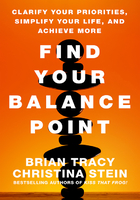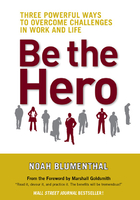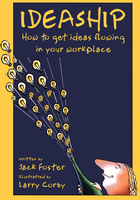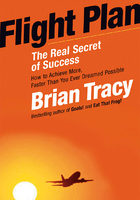The tough stuff is normal. If you are running a company and feel stressed and overwhelmed, you are not alone. Staying committed to your mission, making a profit, growing your business to fit the marketplace, dealing with trends that are out of your control, learning how to deal with the "big guys," and playing the role of CEO are all difficult balls to juggle. There is no magic wand to make it all better. But when other entrepreneurs tell their stories about how they managed, when they share tips and practical wisdom, it can help enormously. The impetus for this book came when we (Lisa and Margot) were both invited to speak to a group of new entrepreneurs at a green business event. We told the stories of how our businesses grew, including the times we made mistakes and what we learned from them. We exposed ourselves as entrepreneurs who had sometimes tried and failed. Warts and all, we shared the experiences we thought would be most useful to someone starting on the path of socially responsible business. The entrepreneurs listening loved what we had to say, and they encouraged us to share these stories with a wider audience. They gave us the courage to write this book.
We wrote this book so you would know that when you face the tough stuff and feel isolated in your business, you are not alone. Many people have been in that boat with you. As business owners, we tend to put on our game faces and pretend everything is fine. Really, we wake up at 3:00 a.m. worrying, eat horribly, drink too much coffee, pour ourselves an extra glass of wine, and don't have time to exercise or meditate. We try to leave our business issues at the door when we go home only to find those issues creeping under the doorsill. Our partners, families, and friends can love us, take us to dinner, and rub our tense shoulders, but unless they've had the experience of running a business, they can't really know how to help. So, ultimately, we stop paying enough attention to our partners and kids. We run values-driven companies, yet we stop looking at our own values. We try to create a better world, yet we are not taking care of our personal worlds. But most of us have no place where we can tell the truth. In order to grow, we have to tell untruths, to position ourselves, especially in the early years, to look bigger than we are in order to attract customers, employees, and suppliers. We add "& Company" to our names even when the only other breathing animal in the office is a Persian cat asleep in the corner. When working with a fellow sole operator, we refer to our work together as "two organizations collaborating" to give the impression that we bring more resources to the work than we actually do. As we grow, we tend to continue this pattern of untruths. As our companies grow, our need to put on our best faces and pretend to the world that we are "doing great!" grows, too.
There are valid business reasons for putting on that game face and not telling the whole truth. As socially responsible business leaders who are committed to a triple bottom line of people, planet, and profit we are expected to see beyond the problems of today and create the dreams of the future. It would never be appropriate to blurt out every truth, and in this book we are certainly not going to advocate adding truth serum to our morning coffee. We must publicly speak about our company's strengths, presenting a formidable presence to our competitors and positioning ourselves to attract customers, capital, and employees. But it is difficult for values-driven business leaders to have to create a web of untruths, half truths, and spin in order develop their companies. Hiding the truth can create an ecosystem that ultimately works against us, making it more difficult to reach out to each other and get the support we need to lead our companies and communities in healthy ways.
We do not intend to hide the truth when we start our businesses; we start our businesses with good intentions. We find a niche for our product or service, offer it at a fair price for the value proposition, and find customers as we begin to grow. We don't know that running a values-based business and trying to make a profit can sometimes feel mutually exclusive. What we are doing is pretty radical. We are trying to change the way business is done. We are striving to focus on the triple bottom line-people, planet and profit. We want to align our passion and values with work in our communities so that we can achieve positive change in the world. The only sane way we can do that is to find places where we can tell the truth. In order to truly be in our power and inspire a vibrant ecosystem that feeds our leaders rather than eats them, we need to find ways to be even more self-reflective and compassionate. We do this by sharing with others the challenges and stressors of running businesses. This book helps us ring a clear bell so that we connect rather than isolate. The two of us start by sharing our own stories, telling our own truth about where we started, what challenges arose, and how we survived.
The Fairy Tale of the Business-Owner Queen
LISA
I wanted to write this book because I was looking for ways that we, as businesspeople, can connect and share the truth about what it is like to run our companies. How can we get support to help us be stronger, better leaders in our values-based businesses? One of the things that appears to stop us is that we think other people know more than we do or that they don't have the same types of problems we have. We develop fairy tales about other business leaders and tell ourselves that everything came easily to them, and we are the only ones who have challenges and sometimes feel like failures. I wanted to speak lightheartedly about this problem, so I wrote my own fairy tale. I'll show you what my fairy tale looks like, and then I will tell my truth. Seeing the difference between fantasy and reality might help you feel less alone as an entrepreneur.
Once upon a time, a long, long time ago (in 1960) in a land far, far away (called Vermont), a girl-child was born as a fully formed Business-Owner Queen. She knew from birth everything there was to know about business. Her very first word was "debit," and her second word was "credit." She started her first business when she was four, sold that, and started her next one when she was twelve. When she was twenty-one, she had a Big Idea and started the company that was going to be the Big Idea she would do her whole adult life.
After sleeping soundly through the night, she always woke refreshed and renewed, and the fire and passion for the business always burned within her heart. Everybody loved her. Her customers never asked for deals, always paid their bills within terms, and always bought more every week. Her suppliers always extended extra terms. They never raised their prices and never short-shipped her on supplies. Her distributors never asked for additional margin or took an unauthorized chargeback. They always paid their bills early. Her employees always appreciated her. They came to work every day they were scheduled and never complained. Her board loved her, her lawyers loved her, her accountants loved her, her business partner loved her, and her bankers loved her. They never asked for her home as collateral. They always increased her line of credit whenever she asked. They never made her sweat her covenants and ratios.
This Business-Owner Queen never had to worry about money. She never ran out of cash, always had a positive cash flow, and took a full paycheck every week with increases every year. She always met payroll without concern, was profitable every year, and could take a price increase whenever she needed to.
Our Queen was written up in magazines and newspapers, was interviewed on television and radio, and was a congressional appointee to the White House Conference on Small Business. She met the president, fielded calls from her legislators, and was asked for her advice about laws that would help her succeed. She always stayed upbeat and positive with an open door.
Then one day she decided it was time to do something else, and the very next day she sold her company for lots and lots of money with no holdbacks or ongoing commitments. Now her phone rings all the time. She has been asked to run for the Senate. She serves on many paid boards, she has been called to write a book about her experiences, and…
All right, let's stop. Whew.
We can laugh about this, but enough of my true life story is in this fairy tale to make me seem like the Business-Owner Queen. In fact, my story is much more complex and the road much more difficult than this tale suggests. Knowing this, I still put other successful business owners into fairy tales, even though their roads were probably just as rocky as mine. We all do this to each other. What I really need to do is tell you my truth and share with you what really happened so we can learn together.
In order to run a business, particularly a values-based, socially responsible business, I had to deal with the tough stuff like everyone else. I learned to deal with this tough stuff early on. I grew up poor in a small town in southern Vermont. My single mom did the best she could raising three kids on a country teacher's salary. Because I was the oldest, it was my job, from a very early age, to cook dinner, lead the laundry brigade, and take care of the younger kids. For a number of years we lived in a tiny one-bedroom apartment. The bedroom was slightly larger than the double bed my sister and I shared. My mother slept on the couch in the living room, and my brother slept in the kitchen. Some nights it was so cold that we would all put on snowmobile suits and crawl into the same bed to keep warm. Sitting down at dinner with us one night, my uncle said, "Even JC couldn't do much with this amount of food." I remember wondering who JC was and not knowing until much later my uncle was referring to Jesus Christ, a man who could feed thousands of people with some fish and a little bit of bread.
Because we were so poor, the community in our small town stepped in to help, and perhaps my commitment to community building and creating local jobs began from this experience. The church held clothing drives and soon afterward, big, green bags of hand-me-downs would arrive on our front porch. My adult self is so appreciative of what people shared with us, but as a ten-year-old I was embarrassed. I wanted to go to work as soon as I could so I could have money to buy new pants. I had two pairs at a time, but they were never new.
When I was thirteen, I got a real job at the stables cleaning stalls and leading trail rides. I remember taking seven city people out on a ride on a nearby dirt road. It never occurred to me to have a plan in case something were to go wrong. And it did. As we rounded a corner, a herd of cattle, led by a charging bull, ran toward us. The horses bolted and left tourists everywhere-lying on the ground, tangled in trees, hanging sideways in saddles that had slipped off the horses' backs. I somehow stayed calm, settled each horse down, helped each rider remount, and led them all back to the barn. When I think back to this story, it's a metaphor for how I learned to stay calm during crises later.
School was a lifesaver for me. I attended a three-room schoolhouse with two grades per room. I would finish my first-grade work quickly and then go across the room and do the second-grade assignments. By sixteen I had finished high school. After dropping out of college (too much, too soon) I came back to Vermont and worked as a prep chef at a French restaurant owned by a female entrepreneur. Because she was such a powerful role model, it never occurred to me that I couldn't run a company.
At twenty-one I began what would be my long journey with Vermont Bread Company. I answered an ad in the local paper for a job at a tiny bakery in rural Vermont. The job had four requirements: be able to drive a truck, be good with people, be able to use a ten-key adding machine, and know the difference between a debit and a credit. I was from Vermont, I knew how to drive anything, I was mostly good with people, and I figured I would learn the rest. I found all sorts of crazy reasons to take home that silly adding machine until I got it, but to this day I don't know the difference between a debit and a credit. That is not to say I don't own my numbers. I know about margins, I know about costing, I can read a financial statement and tell you what is happening in the company and where the issues are, but I cannot do those accounting T-charts that tell you how to make ledger entries. Sometimes the entries are positive and sometimes they are negative, but I don't get it. I found out that you don't really need to know that to own your numbers, so I am lucky.
A few months after I started working at the bakery, we decided to make natural and organic bread. It sounds like an obvious idea today, but in the mid-1970s there were no organic breads in stores (and no organic certifications either). We thought it would be a Big Idea and all the store owners and suppliers would want to help us. Thinking we had a big idea was probably our first mistake. Instead they said, "No, you can't do it. The dough is too stiff for the mixing machines, the bread is too dense to be sliced, and if you put the product into a supermarket it will mold too quickly, so no."
But we went forward with our idea to make organic, natural bread anyway. We had the oven and the mixer, and we made bread just like you would from your grandmother's Joy of Cooking recipe. We started selling directly to consumers through the local farmers' market. We didn't know it, but we were making another mistake: an inconsistent product line. Every batch was different. We tested the bread to make sure it was tasty, and then we sold it. It wasn't until the 1980s that we remedied that and began to make every batch the same. We also made a mistake (twice) just in naming our company. At first the bakery was called Innisfree, named after the Yeats poem. Lovely name, but our customers would say, "What? Industry? Oh, yeah, the Vermont bread company." After a few years we renamed it Vermont Bread Company. But that was another mistake. When we became a national company, the Vermont name confused people. They tried to figure out how bread in Texas could be fresh if it came from Vermont. For that reason, we use our Rudi's Organic Bakery brand as our national brand.
The truth of growing my business from a tiny little bakery on a dirt road to the largest majority woman-owned business in Vermont is not that fairy tale. My house was on the line every day until the moment I sold the company. My relationship with my original bank was strained irreparably after I took over majority ownership. The bank added a large number of new covenants that were not in place when the previous man owned the company. We ran out of cash a lot, especially while we were growing. The last time I ran out of cash was the week before I sold the majority of my company.
As you can see, the real tale is more about believing in a good product, staying calm in the face of adversity, persevering through the tough stuff, and getting the help you need. It is nowhere near a fairy tale with magic wands and a queen's crown.
Surviving the Joys and Sorrows of the Birkenstock Adventure
MARGOT
I like to say, "I didn't found Birkenstock USA; it found me." It didn't start with a business plan to create a values-driven company; it started with my lifelong aching feet. While on a trip to Germany in 1966, I found a pair of sandals that weren't pretty to look at but were shaped like a foot. After three months of wearing them, my toes straightened out. All the exercises the foot doctor told me to do, like standing on a phone book and grabbing it with my toes (which made me feel like a hero if I did it for three minutes), I did automatically with these sandals. This was the spark for my company. It was the 1960s and all women's shoes were narrow and had pointed toes. Even the so-called healthy shoes still had heels. Because millions of women in the United States had painful feet, I thought it would be easy to get them into this marvelous footwear.
My then-husband and I wrote to the company in Germany that made the shoes, saying we'd like to sell them in the United States. After a long while someone from the company wrote back and agreed to our plan. The first shoes were sent to our house via parcel post. My husband had owned an import business, importing modern furniture and implements for the home. He had started in a retail store, moved into wholesale, and finally sold the business. Based on his experience, he told me to start wholesale right away. Since one shoe store in our hometown sold somewhat comfortable footwear, it was my first sales call. I walked in through the back door as the owner was coming out of the stockroom with boxes of shoes under his arm, heading toward a customer. I showed him what I had, and he didn't even stop-he just marched by, saying he could never sell anything like that in his store. That was the end of my first sales call. My husband thought it would be good to have an appointment next time, so he called someone he knew at a European-style shoe store and set up a meeting. The man was very polite, so this time it took over an hour and a half for us to get the same message as before: he could never sell anything like our shoes in his store. After getting turned down by shoe stores, we approached podiatrists, who thought we would put them out of business. I knew I could learn a lot of things, but I didn't think I could ever learn to sell.
Our turning point came when a friend, who was connected with the emerging health-food field, mentioned that the Health Food Association was having a national convention close by in San Francisco and might still have space. Two weeks later I was behind a table with a red tablecloth, displaying our shoes. I showed the sandals to everyone, told my story, and asked people to try them on. These health-food store owners understood the value of the shoes because they were on their feet all day, standing behind the cash registers in their shops. One health-food store owner hobbled through the aisles of the show in her nylons, carrying her uncomfortable shoes. We were not supposed to directly solicit, but I couldn't resist. The woman tried on a pair and bought them despite her husband's protests about how ugly they were and how many other pairs of shoes were in her closet at home.
On the last day of the show, the same woman returned to my booth and took three more pairs of sandals to sell in her store. She made sure all three were in her size so if they didn't sell, she could just wear them herself. Later, she would become my business partner. That's how we got started in 1967, selling shoes to health-food stores. By 1970 my marriage had fallen apart, and I left the business and moved to San Francisco. I supported myself in the profession for which I was trained: dressmaking and dress design. But shoe customers started calling me to say, "Hey, your ex is not keeping up the business. As a matter of fact, he left the country. He left behind a manager without authority to carry on, and now the shoes are beginning to sell and no new shoes are coming in." I didn't have any money because my divorce wasn't settled yet, so I went into partnership with the health-food store owner and her husband. They worked in San Rafael, and I set up our company just above their shop. This worked like a business incubator. I paid $25 a month in rent, and we shared a part-time secretary and stockboy. We didn't sell to our first shoe store until 1973 when a customer complained to her local shoe store that she shouldn't have to go to a food store to buy shoes. By the time I sold the company in 2002, we had two hundred employees and over $120 million in sales.
Who would have known that I would wind up being the head of a successful company like Birkenstock? I grew up in Berlin during the war. The principal of my elementary school was an old Prussian lady-anti-Nazi, like my parents-and she instilled in me the belief that girls were capable of anything and should follow their dreams. My mother thought that was all ridiculous feminist stuff, but my father thought it was safer for me to stay at that school than switch to the Nazi-controlled high school, so I got to stay. During my last year of school, the city was already very damaged by bombs, but the school still offered counseling for children about their careers. Though I hadn't told anyone, I already knew I wanted to go into business, so I was enrolled in a secretarial school. My father and I went to the counselor with all my grades and examples of my embroideries, crafts, and artwork. The counselor said to my father, "It would be a pity for your daughter to go to a secretarial school. She has artistic talents. She should do something with her hands where she can see a finished product afterward." She suggested a prestigious dressmaking school in Berlin.
When we were out on the street, I said to my father, "I'm not going to do that. I want to be an international merchant." I had read an idealistic book about German merchants overseas. It profiled merchants who imported coffee, cotton, tobacco, and other commodities. It also explained how international trade promoted peace and understanding of foreign cultures. I told my father that's what I wanted to do: I wanted people to learn that not all Germans were bad. My father said to me, "My dear, you could never do that as a woman. Didn't you notice that book was all about men? All you can hope for is to type letters for somebody else." It was true at the time. Of course, that's not what I had in mind, but I followed the counselor's advice and wound up in dressmaking school. It turned out to be a great choice-a tremendous help for my life!
The dressmaking school was excellent. From day one the instructors taught us to come up with our own ideas; they never had us copy anything. We created our own embroidery designs, even our own dress patterns. During this time, the war was getting worse. I could not finish school because the building became a hospital for wounded soldiers. I had learned enough to be able to sew well, and I knew how to make dress patterns, which was a very valuable skill. Money could not buy anything at that time. We had become a barter society, and my skills were good "currency." When we were able to get out of the city and move to a village in the country, I made clothes for the farmers' families, and they paid me with eggs and butter. What I did not know then was that this made me an entrepreneur. I was not yet sixteen.
Once the war was over, I went to a school for applied art in Bremen. I was seventeen, the youngest student ever enrolled. But that was another two-year program from which I did not graduate. In 1948 we had a currency reform in Germany, and our money then became worth only ten cents to the dollar. Our savings were gone and my father was unemployed, so we could not afford my tuition. However, two of my friends and I decided that by then we knew more than the teachers, and we set up a dressmaking salon together.
We ran our own business for two years until a customer encouraged me to go into business for myself. Bremen was under U.S. occupation, and a resident had to be only twenty-one years old to apply for any business license. I waited until my birthday and registered the very next day. My business did well, but I could not see a future for myself in Germany. I wanted to go overseas. I had no connections in the United States, but Canada was still taking immigrants. I went to the Canadian Consulate to find out what I needed to do and was told that if I could find a job in Canada, I could get a visa. I was in the waiting room for a long time, and I read through all the newspapers. There were some German-language newspapers, and I found out that the president of the German Club in Toronto was a ladies' tailor. I copied his name and address, and I wrote to him about whether he could help me put an ad in the newspaper so I could look for a job. Lo and behold, he wrote back and said although he couldn't promise a long-term job, he needed somebody for four or five months, and if that was enough for me to take a risk, then I could have a visa. That letter came in November. (I know it was November because on my mother's birthday I went back to the consulate. All my aunts thought I was a bad girl for not attending my mother's birthday party.) By December 31, 1951, at the age of twenty-two, I was traveling overseas on a boat all by myself.
I arrived in Canada in the middle of January 1952. There I was in the New World, free from all the restrictions that had hampered me and open to all that was to come. I hardly spoke the language, all I had was $25 in my pocket and a promise of a few months' pay, but I was excited! What a chance for a new beginning. I can still feel the sense of exhilaration that came over me when our train finally pulled into the station in Toronto. Fresh snow had fallen overnight, and the sun came out bright and clear in the morning. I took it as a good omen.
At the time, I had no idea that the dream of that little girl in bomb-struck Berlin to become an international merchant would come true one day! I expected new difficulties to come my way, but I felt that I would be able to handle them when they did. Luck had smiled on me so far, and I hoped it would continue. I promised myself right then and there to tread lightly on this earth, to let life unfold and never to get too stuck on particular results. My experiences in the war taught me that you can never really own anything-everything in life is only on loan. With that lesson, I survived the joys and sorrows of my Birkenstock adventure.
What We Learned
We both wish we could go back and talk to our younger selves. In a sense, that is what we are doing in writing this book: sending a message in a bottle back to ourselves when we were there. Here we provide conversations with leaders who speak plainly about facing the tough stuff. As Margot keeps reminding us, this is not an answer book or a how-to book, it is a book about staying resilient and flexible even when we feel like everything is crashing down around us. It is about trying to see clearly and truthfully in the midst of real complexity. It is about understanding how the outer ecosystems of our companies and the inner ecosystems of ourselves are interrelated. We hope this book helps others who are in the same shoes we walked in years ago.















